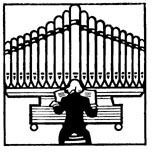
A Failed Experiment
THE IMPACT LITURGICAL MUSIC HAS ON FAITH
The most beautiful Mass in which I ever participated was a brief Easter Sunday Mass in the Church of the Holy Sepulchre in Jerusalem, at the tomb of Christ. Present were one priest and three other laypeople: my wife and two of our daughters. The only music was the Eucharistic Prayer, chanted by the priest, and the Responsorial Psalm, which my wife chanted. I have also attended beautiful large Masses with full choirs, including papal Masses at St. Peter’s Basilica in Rome. Unfortunately, not all Masses are as beautiful as they could be.
The beauty of the Mass comes through the miracle of the Eucharist and God’s Word, but sometimes the music can distract from this reality. Even with all the turmoil and scandal in the Catholic Church today, it is still important to get the music right because, in a way, some of the scandal and turmoil is a result of the music.
My intent is not to discuss the Catholic musicians who have composed music that sounds like the theme song to a children’s cartoon (such as Dan Schutte’s Mass of Christ the Savior, which has been referred to derisively as Missa My Little Pony) or who have written a song celebrating LGBT Pride Month (“You’ve Made Me Wonderful” by David Haas, who’s been accused of sexual battery and spiritual manipulation). Nor is it to discuss genres, instruments, or publishers. Rather, it is to examine the less obvious but very powerful impact that liturgical music can have on our faith.
Some of the greatest music of all time was composed by Catholics, and some of these compositions were specifically written for the Mass. Haydn, Beethoven, Mozart, and Vivaldi were all faithful Catholics (though not saints). Some great non-Catholic Christian composers, such as Bach and Stravinsky, also composed music for the liturgy. For some reason, however, our leaders decided that their compositions were no longer suitable for the worship of God. We all know about the destruction of high altars, Communion rails, confessionals, and statues in the 1960s and 1970s. During that time, we also demolished traditional liturgical hymns, substituting folk music, which was popular then. I confess that I like some folk music — just not during Holy Mass. Allow me to explain why.
You May Also Enjoy
To all the people not theologically schooled, a definite message has been communicated about the meaning (or lack thereof) of the Eucharist.
We need a clearer understanding of the Church’s relationship with her past and her tradition that will help guide us along the uncharted road ahead.
Good liturgy involves good taste, and, as Burke said, taste depends on rational judgment, emotional maturity, and education — that is to say, the virtues.

